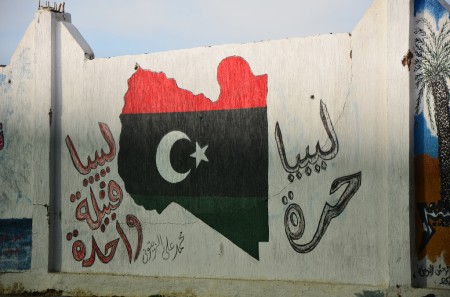
This article was originally published by Carnegie Europe on 2 February 2016.
Almost five years since the start of NATO’s military intervention in Libya, there is mounting speculation that a coalition of Western countries will launch a new military campaign there to tackle the growing threat from the self-styled Islamic State.
Since the 2011 ouster of strongman leader Muammar Qaddafi, a civil war has prevented the formation of a functioning Libyan government, creating the space for both the emergence of an Islamic State–controlled area around the city of Sirte and large flows of migrants and refugees into the EU. (Over 157,000 refugees and migrants have crossed the Mediterranean to Italy alone since January 2015.)
No one expects the EU to bomb the Islamic State. But on the whole, Libya is a rare security challenge for which Europe should take more responsibility than other external powers such as the United States.
For one, Europeans have more direct security interests at stake in Libya, which is why France and the UK initiated the 2011 intervention. For another, NATO now seems unlikely to act, partly because the image of its 2011 intervention is tarnished among some Libyans due to a lack of follow-up, and partly because the alliance is busy deterring Russia in Eastern Europe. Plus Libya is much less geopolitically contentious than Syria, where Iranian- and Russian-backed forces face off against Western- and Saudi-supported factions.
To be fair, the EU has strongly supported UN diplomatic efforts to form a unity government of rival Libyan factions and has deployed four missions to tackle some of the security challenges emanating from Libya since 2011. But there are at least three lessons from the EU’s Libya-related operations that reveal something deeper about both the limits and the potential of the union’s security and defense policies.
First of all, one shouldn’t expect the EU to lead robust military interventions.
Based on their difficulties during the Yugoslav Wars in the 1990s, part of the inspiration for European governments to launch an EU defense policy in 1999 was to ensure that Europeans could carry out high-intensity military operations without U.S. help if necessary.
The EU undertook some reasonably testing missions during the 2000s, such as in the Democratic Republic of the Congo in 2003 and in Chad in 2008, and many observers (including this author) suggested then that the EU should be prepared to conduct more intense operations in the future.
In principle, the 2011 Libyan crisis was ready-made for an EU-led response, especially because the Pentagon was cautious about a U.S. intervention. In practice, the United States ultimately decided to join Britain and France in a NATO operation in mid-March 2011.
Instead, EU governments agreed on April 1, 2011, (without any intended irony) to deploy a military operation to assist the efforts of the UN humanitarian agency in Libya. But the agency never asked for the EU’s military help, and EUFOR Libya, as the EU operation was labeled, became a ghost mission.
Because of this inability to act, the then French foreign minister Alain Juppé reportedly said that EU defense policy was dead. This has not proved exactly right, as the policy still exists and the EU continues to carry out (small) military operations. But the aspiration for the EU to lead robust military interventions died in the Libyan sands in 2011.
The second lesson is that the EU shouldn’t assist countries without legitimate governments.
The EU has increasingly focused its external security missions on capacity building in neighborhood countries, for instance training Malian forces to cope with terrorists. Assisting states in Europe’s broad neighborhood, many of which are weak, makes sense as they can help tackle security challenges at source.
The EU sent a border-assistance mission to Libya in 2013, but its efforts there were in vain. Due to the country’s civil war, there was no government to work with and the mission moved to Tunisia. Even if there had been a legitimate and functioning government, the EU operation initially had only around 100 personnel and a paltry annual budget of €30 million ($33 million).
Insiders in Brussels suggest that the EU may soon send trainers or other types of military experts to Libya, perhaps to help disarm and demobilize militants. Sending peacekeepers has been mooted in the past, but EU officials have said that any European effort would most likely form part of a broader international peace-support endeavor, perhaps led by the UN—and maybe involving the African Union and Arab League too. This would prove useful only if there were a legitimate government in place and the EU and others provided adequate resources.
The third lesson is that the EU has a useful military role in European homeland security.
Europeans voters currently care mostly about internal security, especially how the EU can help cope with the refugee crisis. In relation to Libya, two EU military operations show the potential for the union to play a much more useful military role in protecting the European homeland.
One, named Operation Sophia, is trying to tackle the smuggling of migrants from Libya, loosely modeled on the EU’s successful antipiracy mission on the seas off Somalia. The other, a search-and-rescue operation in the Mediterranean code-named Operation Triton and coordinated by the EU’s border agency, Frontex, rather than by its foreign policy structures, has saved thousands of lives since November 2014.
All these Libya-related experiences point to a new future for EU military activities. The EU should develop a clearer military role protecting the European homeland, alongside contributing more to international security.
Daniel Keohane is a senior researcher at the Center for Security Studies at ETH Zürich.
For more information on issues and events that shape our world, please visit ISN Security Watch or browse our resources.

